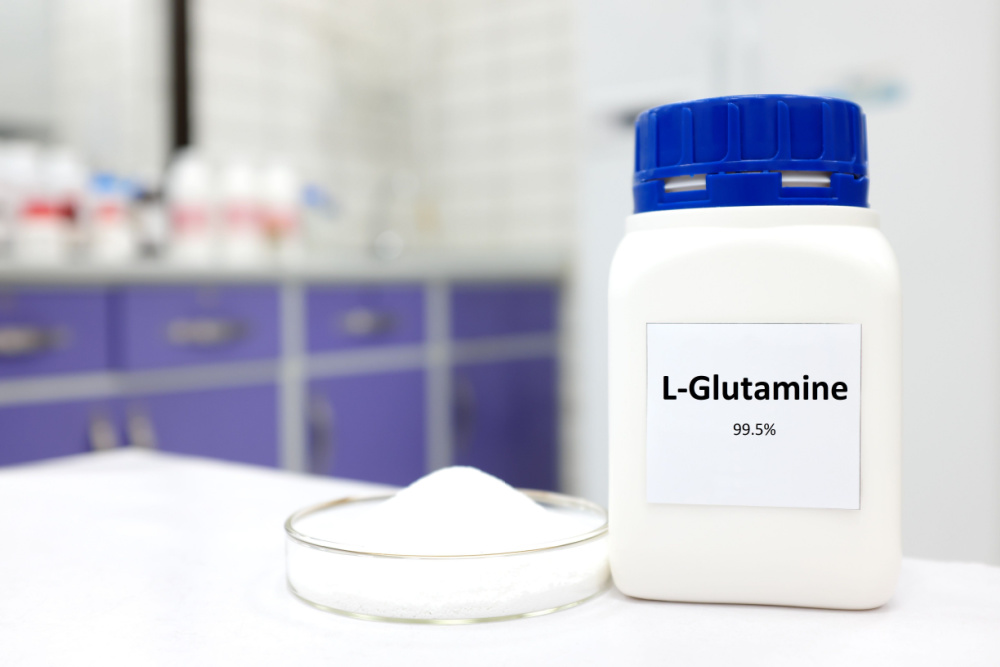If you’re struggling to lose weight it’s natural to seek solutions to help you reach your goals. One trendy supplement currently sweeping social media is L-glutamine. But does L-glutamine work for weight loss?
The answer isn’t straightforward. While you should always take unvetted social media advice with a grain of salt, this one may have some truth to it. In this post, we explore what L-glutamine is and its potential benefits for weight loss. We also cover if it’s something to consider for your weight loss journey. Let’s dive in.
What is L-glutamine?
L-glutamine, often called glutamine, is an amino acid that your body naturally produces. Amino acids are building blocks of proteins. Proteins help your body perform essential functions, like breaking down food and building muscle tissue.
L-glutamine is the most abundant amino acid in the human body. Your muscles make glutamine before it makes its way to other systems. Like many amino acids, the primary function of glutamine is to help your body make proteins.
Your diet naturally provides your body with L-glutamine. Foods like tofu, beef, chicken, pork, dairy products, nuts, and green vegetables are all good dietary sources of L-glutamine.
You can also get L-glutamine through supplements. L-glutamine supplements are particularly popular in fitness communities and social media circles. As of the time of publication, there were more than 24,000 posts with the #lglutamine hashtag on Instagram. And on TikTok, there were more than 271 million collective views for videos on the topic.
But why are L-glutamine supplements such a huge trend? Their popularity stems from their potential to enhance performance and support weight loss. But is there any truth to these purported benefits?
Does taking L-glutamine help with weight loss?
Is L-glutamine just the latest health trend or does L-glutamine for weight loss actually work?
Some studies indicate that L-glutamine helps with weight loss in the short term. A study on oral glutamine supplementation published in Nutrients found that it may reduce waist diameter in some individuals. Another study on the effect of glutamine supplementation published in Nutrition showed L-glutamine lowered body fat percentage in patients with type 2 diabetes.
Research published in The American Journal of Clinical Nutrition on oral glutamine found that glutamine can increase circulating glucagon-like peptide 1 (GLP-1) levels in type 2 diabetics. GLP-1 is a natural hormone that helps insulin secretion and lowers blood sugar. GLP-1 agonist receptor medications are a class of type 2 diabetes and weight loss drugs that mimic GLP-1 to help with blood sugar control and may help with weight loss.
More research is needed to understand the full breadth of L-glutamine’s benefits for weight loss. Of course, your results may vary on an individual level. A Reddit user discussion on L-glutamine where people discussed their experiences taking it for weight loss and fitness included varied results. Many users reported benefits like fast workout recovery, while others noted adverse reactions.
Some Reddit users also say they had improved gut health (users were consumers, not medical professionals). Gut health correlates to maintaining a healthy weight. Research on gut microbes published in the American Society for Microbiology found that our gut microbiome, or the balance of bacteria in our gut, can affect our ability to lose weight.
How does L-glutamine lead to weight loss?
While studies show promise for L-glutamine for weight loss, how does it work?
L-glutamine helps people lose weight a few ways, including:
Balancing the gut microbiome
Your gut microbiome is the ecosystem of good bacteria in your digestive tract. Your gut health affects your overall health in several ways. As mentioned earlier, a healthy gut microbiome can help with weight management.
Possibly improving insulin sensitivity
Insulin sensitivity refers to how sensitive your body is to insulin. Insulin helps control blood sugar levels, which affects hunger. The jury is still out on the link between insulin sensitivity and L-glutamine. But, some human and animal studies on oral glutamine supplementation published in Nutrients found that L-glutamine improves insulin sensitivity.
These studies suggest it may help your body use insulin more efficiently, which can help decrease the risk of weight gain. This can make weight loss efforts, like exercise and controlling calories, more effective.
Inflammation
Research on the role of glutamine in the intestines published in the International Journal of Molecular Sciences also indicates that L-glutamine helps with chronic inflammation. Chronic inflammation has been linked to weight-related conditions, such as obesity.
Inflammation impairs the body’s ability to produce leptin, which helps regulate appetite and control metabolism. Inflammation also impairs its ability to process insulin. If your body isn’t producing enough leptin, it can be more difficult to maintain a healthy weight. And impaired insulin production leads to higher blood sugar levels, which can also lead to weight gain.
There’s more research needed on the mechanisms of L-glutamine and how it affects weight loss.
Should I take L-glutamine supplements?
The nagging question is, do we need to take glutamine supplements to realize the benefits L-glutamine may offer for weight loss?
The answer is that most people can get the L-glutamine they need from diet alone. There are specific foods high in L-glutamine, but almost any food that has protein has some, And if you’re getting enough protein in your diet, you should be able to get enough glutamine.
However, certain medical conditions like stress, injury, or infection can make it difficult to meet your body’s glutamine needs. In these cases, supplementation can help make up for the deficiency.
If you do decide to take L-glutamine, it’s best to speak with a healthcare provider first. Based on your medical history, they can determine if L-glutamine is safe for you. A provider can also create a weight loss program designed for your unique needs. They can supervise the process, make suggestions, and adjust your plan as needed.
Remember, weight loss is complex and unique to each person. This is why weight loss and weight management plans are best tailored to the individual. Results will also take time and vary person to person. But a healthy-paced, medically supervised weight loss program is the safest way to lose weight.
What to know before you take an L-glutamine supplement
L-glutamine is generally safe for most people. Our bodies naturally produce it and various studies on the safety of glutamine confirm its safety. But, it’s possible to experience negative side effects from taking glutamine supplements. Side effects are generally mild and may include:
- Dizziness
- stomach pain
- Heartburn
- Nausea
It’s also important to note we don’t fully understand its potential long-term effects or if supplement weight loss pills are safe.
While the FDA regulates dietary supplements, the regulations it uses are different from the ones it uses for prescription or over-the-counter drugs. And the safety and effectiveness or accuracy of labels for supplements aren’t approved by the FDA the way prescription drugs are. This means brands can vary in quality, purity, and how much active ingredient they contain or say they contain. Always use supplements as directed and under the guidance of a healthcare provider.
This article is not medical advice to take L-glutamine supplements. You and your healthcare provider can determine if they are safe and what’s right for your weight loss needs.
How to take L-glutamine supplements
It may be worth trying L-glutamine if you’re frustrated with your weight loss progress. If you and your healthcare provider determine L-glutamine for weight loss is right for you, here are a couple of ways you can add it to your routine:
- Dietary changes — L-glutamine is in many foods. Eating things like tofu, beef, green veggies, and dairy as part of a healthy diet can increase your L-glutamine intake. Keep in mind, simply eating these foods won’t be enough to lose weight. You need to keep an eye on your overall diet and watch your caloric intake to achieve results.
- Supplements — Supplements are another way to get more L-glutamine. You can find L-glutamine dietary supplements in both pill and powder forms.
The best time to take an L-glutamine supplement for weight loss is in the morning on an empty stomach. But, this may vary depending on your weight loss program. Make sure to take these supplements as directed.
Also, do research into which brand is best for you. Finding a supplement that has U.S. Pharmacopeia (USP) verification is a good place to start. USP is a scientific nonprofit that audits the quality of medications, dietary supplements, and foods.
Find a healthcare provider on Klarity and start your tailored weight-loss journey today
L-glutamine isn’t a magic weight loss bullet. Weight loss is complex and is best achieved under the guidance of a healthcare provider.
Struggling with where to start your weight-loss journey? Find a provider on Klarity and get expert medical advice and support. The Klarity platform lets you find healthcare providers who specialize in weight loss. Depending on your needs, your provider can prescribe a safe weight loss medication, recommend exercise routines, suggest supplements, and give advice on lifestyle changes.
The information provided in this article is for educational purposes only and should not be construed as medical advice. Always seek the guidance of a qualified healthcare professional with any questions or concerns you may have regarding your health.
How we reviewed this article: This article goes through rigorous fact-checking by our team of medical reviewers. Our reviewers are trained medical professionals who ensure each article contains the most up-to-date information, and that medical details have been correctly interpreted by the writer.







